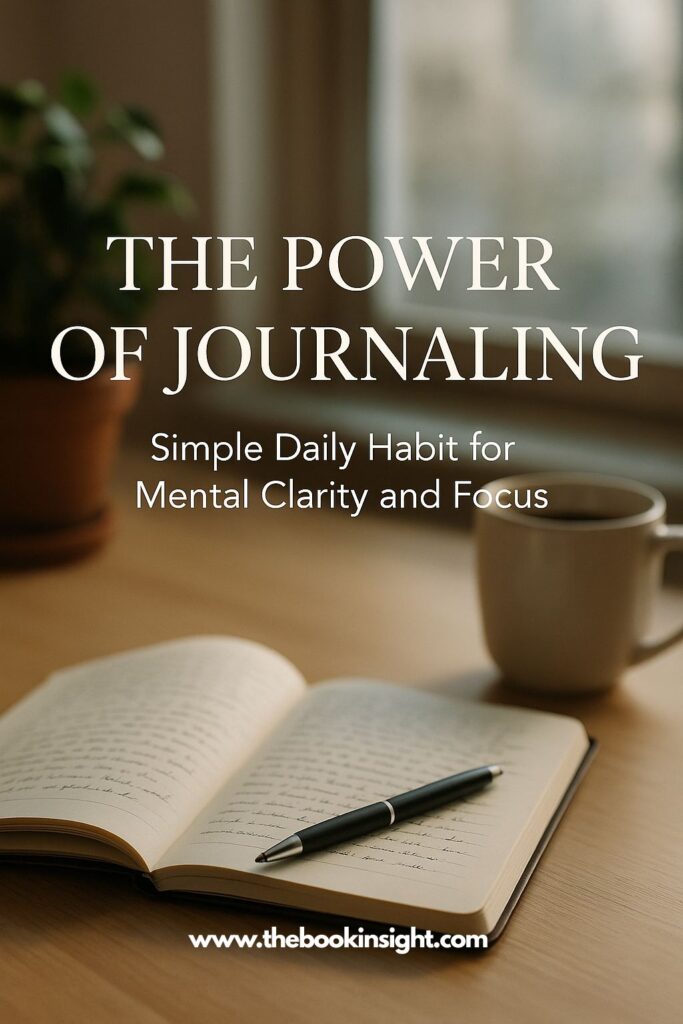Table of Contents
ToggleThe Power of Journaling: A Simple Practice for a Clear Mind
What is Journaling and Why Does It Matter?
In simple words, journaling is the daily practice of writing down our thoughts, feelings, and experiences on a regular basis. It reflects our day-to-day life, emotions, and goals, helping us understand both our inner and outer worlds from our own perspective. A journal can be kept in a traditional diary or maintained digitally on a computer or laptop. What many people don’t realize is that this simple act holds a unique power—this is The Power of Journaling.
In today’s fast-paced and often isolating world, many of us go through phases of loneliness, feeling like there’s no one who truly understands us. That’s where the Daily Journaling Habit becomes a trusted companion. Putting our thoughts on paper or into a digital journal helps reduce stress, clear mental clutter, and provide a safe space for honest self-expression.
The reason The Power of Journaling is gaining such popularity is simple—it works. It’s a cost-free, private, and effective way to improve emotional well-being, enhance self-awareness, and sharpen focus. Whether you want to manage stress, track personal growth, or gain Journaling for Mental Clarity, this practice offers countless benefits—one page at a time.
The Power of Journaling for a Clear Mind
At its core, journaling is the practice of putting your thoughts into words to express both your inner emotions and your observations of the outer world. Unlike casual note-taking, it’s an intentional habit that helps capture feelings, ideas, and reflections in a safe space.
There are many forms of journaling, each serving a unique purpose. Gratitude journaling helps you focus on what you already have, fostering positivity, deeper connection with nature, and a sense of spirituality. Daily logs are a simple record of your day-to-day activities, allowing you to track habits and progress over time. Reflective journaling encourages deeper self-analysis, helping you learn from experiences and make better decisions. Integrating these approaches into a Daily Journaling Habit can significantly enhance your self-awareness and mental balance.
The true strength of this practice lies in Journaling for Mental Clarity. Our minds are constantly active, often leaning toward negative or repetitive thoughts. Research suggests that the majority of daily thoughts are unproductive or even harmful to our mental well-being. The Power of Journaling is that it redirects this mental energy—when you write, your focus shifts to organizing thoughts rather than letting them spiral. This process clears mental clutter, reduces stress, and makes room for more constructive thinking.
The Power of Journaling for Mental Clarity
Mental Clarity: Organizing Thoughts with Journaling
Journaling brings you into the present moment—the cornerstone of mental clarity and mindfulness. By writing about past incidents or future plans, you’re anchoring your thoughts in now, instead of drifting into the past or future. This mindful focus is a key part of Journaling for Mental Clarity.
Stress Reduction: Journaling as an Emotional Outlet
A growing body of research underscores that expressive writing eases stress and emotional turmoil. For instance, studies show that just 15 minutes of journaling per day can significantly lower anxiety, depression, and overall distress.
Moreover, journaling can “tamp down stress hormones” by refocusing the mind on positive topics, meaningful experiences, and strong relationships. Another meta-analysis of journaling interventions found a 9% reduction in anxiety symptoms, a 6% decrease in PTSD, and overall 5% improvement in mental health measures.
Self-Reflection: Understanding Patterns and Enhancing Decisions
The habit of self-reflection through journaling trains you to notice recurring thought patterns and emotional triggers. In likening journaling to a therapeutic tool, expressive and reflective writing has shown long-term benefits—improving physical and mental health, immune response, mood, and even memory.
A UK study reviewing 51 studies (1930–2023) found that focusing on gratitude, reflection, and envisioning a positive future via journaling significantly lifted individuals’ moods—highlighting an easy, free hack for emotional well-being.
How to Start Journaling?: Simple Tips for Beginners.
Starting a journaling practice doesn’t have to be complicated. In fact, the easier it is, the more likely you’ll turn it into a lasting Daily Journaling Habit. Here’s how you can begin:
1. Keep It Simple — Pen & Paper or Digital Tools
You can start with a classic pen and notebook or go digital using your phone, laptop, or tablet. Since most of us carry our phones everywhere, it’s convenient to jot down thoughts whenever they arise. However, digital tools can also bring constant distractions. Just like the strategies shared in our Deep Work and Hyperfocus book summaries, consider switching your device to airplane mode or disabling notifications while writing. This helps you stay fully immersed in The Power of Journaling without interruptions.
2. Set a Dedicated Time (Morning or Evening)
Consistency is the secret to experiencing the full Benefits of Journaling. Whether you choose the calm of the evening—when the day’s distractions fade—or the freshness of the morning—when your mind feels energized—stick to that schedule. A fixed time trains your brain to expect and value this reflective space, making Journaling for Mental Clarity a natural part of your day.
3. Write Freely Without Judgment
The most rewarding journaling happens when you write with honesty and without self-censorship. This is your private space—your thoughts, feelings, and reflections are for you alone. If privacy is a concern, modern digital tools allow you to password-protect your entries, ensuring your journal remains secure. The key is to let your words flow, free from fear or outside opinions, so you can fully tap into The Power of Journaling for self-expression and clarity.
Types of Journaling You Can Try
Exploring different styles can help you find the form of journaling that best fits your personality and goals. Here are some of the most popular types to try:
1. Gratitude Journaling
Gratitude journaling is the practice of regularly writing down things you are thankful for—big or small. This simple yet powerful habit shifts your focus toward positivity, helping to counter negative thoughts and improve mood. Studies show that gratitude practices can increase happiness levels and reduce symptoms of depression. Incorporating gratitude into your Daily Journaling Habit can also enhance emotional resilience and overall well-being, making it a key part of The Power of Journaling.
2. Bullet Journaling
A bullet journal uses evenly spaced dots instead of lines, offering a flexible and highly customizable layout. It can be used to track anything—from your mood and habits to your daily steps and work tasks. Many people also include reflective prompts such as “One thing that made my day” or “My intention for today.” This format allows you to blend planning, creativity, and reflection, turning your journal into both a productivity tool and a mindfulness practice. Linking this method with the focus strategies from Deep Work can make bullet journaling an excellent way to organize your life while maintaining Journaling for Mental Clarity.
3. Reflection Journaling
Reflection journaling focuses on deeper self-analysis. It involves looking back on your day, week, or month to identify patterns, lessons, and insights. This type of journaling encourages personal growth by helping you understand why you think and act the way you do. Over time, reflection journaling sharpens decision-making skills and promotes a healthier, more balanced mindset—showcasing one of the most profound Benefits of Journaling.
Conclusion: Start Your Journaling Journey Today
In a world where every second we are bombarded by notifications, ads, and constant information, mental clarity can feel like a rare luxury. This is where The Power of Journaling truly shines—it’s a simple, accessible way to clear mental clutter and reconnect with your thoughts. Just as shared in our Dopamine Detox summary, reducing mental noise is essential for focus and well-being, and journaling is a natural companion in this process.
Small steps are the foundation of big change. As Darren Hardy explains in The Compound Effect, starting with just 1% effort daily builds momentum over time. The same principle applies to journaling—writing even half a page a day can grow into a consistent Daily Journaling Habit. Over weeks and months, this routine compounds into better focus, reduced stress, and a deeper connection with yourself.
So, don’t wait for the “perfect” time—start today, one page at a time, and experience how Journaling for Mental Clarity can simplify your life and sharpen your mind.
Related Article Links for Interlinking
Why Reading Books is the Best Investment
“Just like journaling, reading is a powerful tool for self-growth. Discover why dedicating time to books can be one of the best investments in yourself in our article Why Reading Books is the Best Investment.”
Unstoppable Power of Consistent Practice
“Building a Daily Journaling Habit works just like any other skill—it’s about consistency. Learn how small, steady actions create big results in our post Unstoppable Power of Consistent Practice.”
Overthinking: Understand the Mental Loop
“Journaling can break the cycle of overthinking by giving your thoughts a place to land. Read more about the patterns behind overthinking in Overthinking: Understand the Mental Loop.”
Pomodoro Technique for Time Blocking
“Struggling to find time for journaling? Try pairing it with the Pomodoro Technique to stay focused and distraction-free. Learn how in Pomodoro Technique for Time Blocking.”



